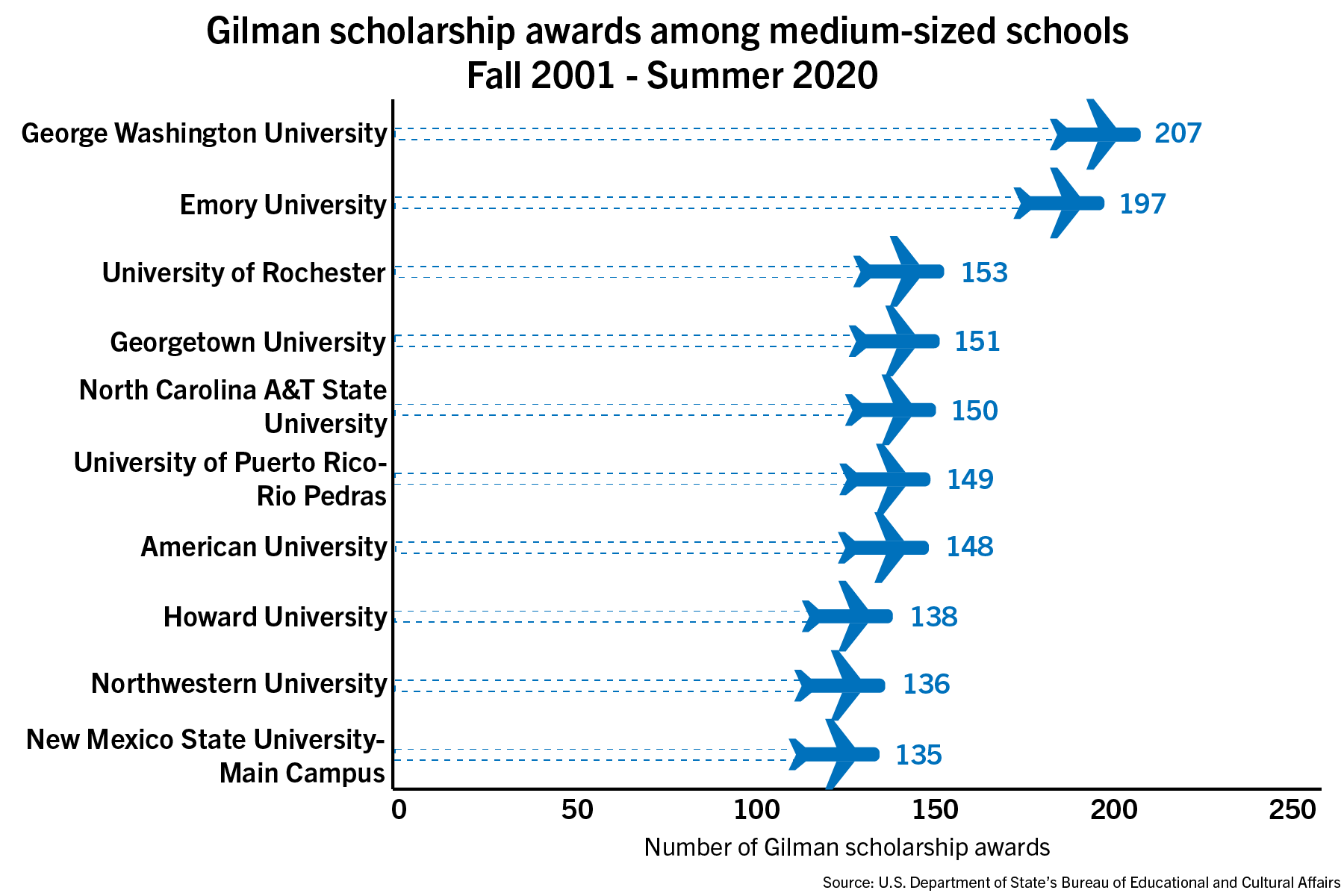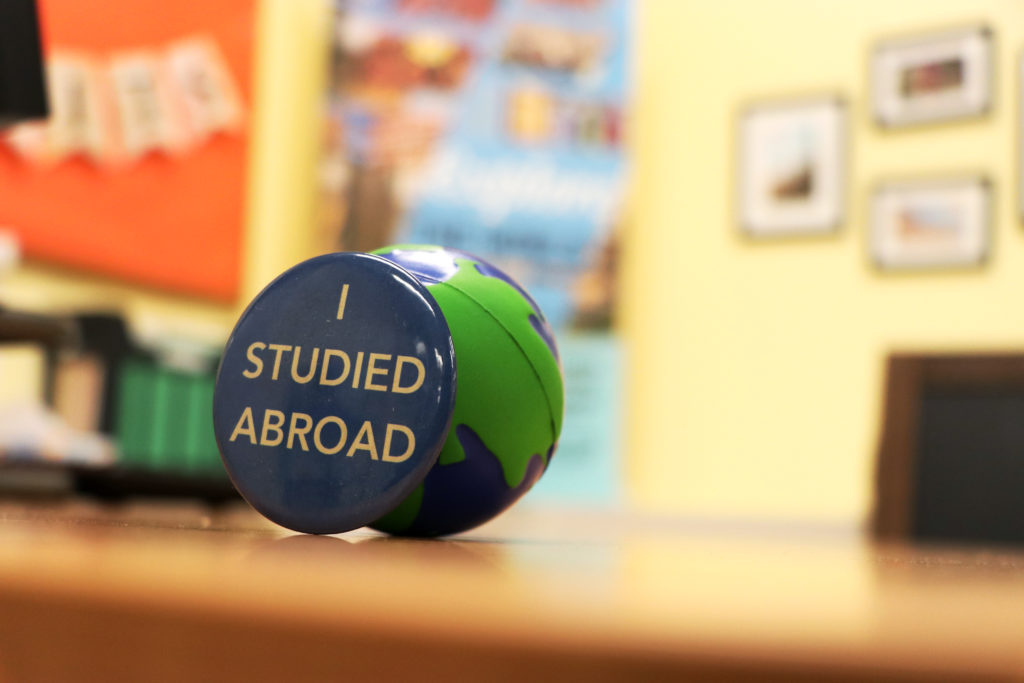GW has produced more recipients of a State Department study abroad scholarship than any other U.S. institution of its size.
A total of 207 GW students have received funding from the Benjamin A. Gilman International Scholarship, which awards undergraduate Pell Grant recipients up to $5,000 to study and intern abroad, the highest among other “medium-sized” U.S. higher education institutions with between 5,000 to 15,000 students. Officials from the study abroad office said the University has become a top producer of Gilman Scholarship recipients because of an increase in overall study abroad participation before the pandemic along with greater levels of promotion through info sessions and support and outreach programs at GW.
Kimberly Rush, the office’s manager of advising services, and Jennifer Donaghue, the executive director of international education, said in a joint email that the Gilman Scholarship has reduced the costs of study abroad and allowed more students to experience an international education. They said the scholarship has helped the office fulfill its mission to ensure that study abroad is accessible to all students.
“The Gilman Scholarship has assisted us in our efforts to break down barriers and improve diversity, equity and inclusion in study abroad,” they said.
GW has been the second highest producer of the Gilman Scholarship among the University’s peer schools, according to State Department data. New York University, which has a significantly larger undergraduate population, was first with 307 recipients while Syracuse University was third with 180 students, followed by the University of Southern California, University of Rochester and Georgetown University at 159, 153 and 151 students, respectively.

Nicholas Anastacio | Graphics Editor
Rush and Donaghue said 15 students received the scholarship for the March 2021 deadline cycle, which includes study abroad programs for this summer and fall and next spring, and 13 students received the maximum amount of $5,000. The officials said the number of scholarship recipients peaked in the fall 2018 cycle with 20 students, but GW has averaged between 10 to 15 per semester in “recent” application cycles.
“Our status as a top producer of Gilman Scholars, we believe, is largely a result of both the hard work and dedication of GW students in submitting competitive application essays as well as our office’s resources, support and outreach for the program with the help of campus partners like the University Writing Center,” they said.
Rush and Donaghue said the spring semester before the COVID-19 pandemic drew the most Gilman scholarship applicants at GW and the highest number of students enrolled in a study abroad program, totaling nearly 600 students studying in a different country. They said the study abroad office’s level of outreach and promotion of the scholarship, like info sessions, essay workshops, alumni events and newsletters, spread the word among students interested in programming and helped them develop “competitive applications.”
The officials said the scholarship provides students with “direct funding” for any study abroad related fees, like transportation costs, books and supplies, while most higher education scholarships can only be used toward tuition and billable fees.
“This scholarship has supported students in defraying the costs of both the billable and personal expenses associated with study abroad, often making the experience possible for them,” they said.
Rush and Donaghue said the scholarship also provides recipients a year of “noncompetitive eligibility” hiring status within the federal government for job openings outside the normal process. They added that recipients of the Gilman scholarship join a “diverse” alumni network with opportunities to attend networking events and conferences worldwide.
“As international educators, our office believes in the power and value of study abroad as a tool for fostering intercultural competencies and skills needed to succeed in a global marketplace,” they said.
Experts in study abroad said universities that are high-placing producers of the Gilman scholarship are holding workshops to promote the opportunity and assist students with the application process. They said the scholarship has allowed more students, especially from lower-income households, to afford to study abroad and broaden their “worldview.”
Jess Mercier, the study abroad adviser and coordinator for outreach at the University of Florida, said the Gilman scholarship has allowed students who are “traditionally underrepresented” and cannot afford to travel abroad normally to expand their educational experience. She said she has heard from recipients at UF that they were only able to study abroad with the funding from the Gilman scholarship and underwent a “life-changing” experience while doing so.
“Even just the possibility of receiving the Gilman makes study abroad more realistic to these students, rather than an unimaginable goal,” she said.
Janelle Waldrep, a study abroad coordinator at San Francisco State University, said universities must answer questions, promote the scholarship and help students create their portfolios to help more students obtain the award. She said officials advise students on the benefits of study abroad, like the expansion of global connections and professional opportunities regardless of ethnicity and socioeconomic status, to promote the award.
“A year abroad is the best investment that you can make in yourself with regard to your future,” she said. “You will have opportunities to travel, make degree progress and you will find doors opening up that you cannot even begin to imagine yet.”








